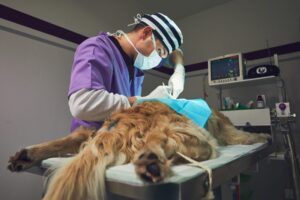
Mast cell tumors require a swift response and a board-certified veterinary surgeon to get your pet back to full health.
The idea of our beloved pets developing tumors, even benign ones, is scary and worrisome. However, it does happen and it requires a quick response to seek treatment. Mast cell tumors are skin tumors that can affect both dogs and cats. While they are the most common type of skin tumor found in dogs, they are the second most common type for cats. If your pet has any unusual skin tags, lumps, or lesions, it’s always a good idea to have it looked at by your primary care veterinarian to determine what it is and how to treat it.
Who’s at risk?
All dogs and cats are at risk of developing mast cell tumors. However, there are breeds that are predisposed to experiencing them and make up the majority of cases. According to the American College of Veterinary Surgeons (ACVS), Boston Terriers and Boxers account for approximately 50% of all cases. For cats, Siamese are the most susceptible. The majority of cases happen in animals that are middle-aged, but mast cell tumors can occur at any life stage.
What are the symptoms?
Since mast cell tumors can vary widely in severity, it’s always a good idea to keep an eye on your pet and monitor for any unusual lumps or growths. These tumors can be small and freely moving, or they can become quite large with severe inflammation. Hair loss around the growth, loss of appetite, vomiting, and abdominal pain are also symptoms that can become present once the tumor begins to grow. Keeping tabs on any new masses and having them promptly examined by your veterinary team will help catch these pesky, and sometimes very severe, masses before they can progress and cause additional problems.
How is it treated?
Surgical intervention by a board-certified veterinary surgeon is the preferred treatment option for mast cell tumors. These tumors are invasive and require removal to protect the surrounding tissue and keep the tumor from spreading. Having the affected tissue removed surgically will offer the best prognosis for your pet. After removal, the tumor will be graded to determine the prognosis of your companion and help your veterinary surgeon and primary care veterinarian decide on post-operative treatment options. The grading of the tumor is also the other factor in determining the full prognosis of your pet, so it’s a critical step to determining how to move forward after surgery. Some patients will require adjunct therapy such as chemotherapy. The recommendation for additional treatment is guided by the results of biopsy and grading.
Trust Maryland Veterinary Surgical Services With Your Companion’s Health
Your companion’s health is important, and the team at MVSS is ready to provide the best care possible for your furry family. We are dedicated to combining comprehensive exams and assessments with informative and honest discussions of your companion’s care. Once we have worked with you to decide on the best course of action for your dog, our professionals will use their surgical expertise to work towards the goal of giving your companion an active and pain-free life. We are proud to serve loyal companions in Catonsville and Baltimore. To learn more about our services, give us a call at 410-788-4088 or visit us online. For more information and tips for pet health, follow us on Facebook and Pinterest.
